Difference Entre Google Home Et Alexa
Why y'all should trust the states
Signe Brewster has spent the past 7 years writing about emerging technology, including the development and long-term implications of robotics, AI, and automation. She wrote Wirecutter's guide to smart displays and secretly wishes someone would bring dorsum Jibo.
Grant Clauser has been reporting on and testing electronics since the arrival of the first DVD thespian and has held top editorial positions in numerous merchandise and consumer publications. Grant has had AV training and certifications from the likes of THX, ISF, the Home Acoustics Brotherhood, and Sencore. He has likewise completed Control4'due south dwelling-automation programming training, programmed many home-automation devices, and reviewed hundreds of products.
How to pick your voice banana
A voice-controlled speaker tin can streamline basic personal-assistant tasks similar making shopping lists, setting alarms and timers, and answering simple search queries (as in, "What's the capital letter of Kansas?" or "Convert ii tablespoons into milliliters"). They besides work well for controlling smart homes: "Computer, turn on my lights!" Typically, someone buying a smart speaker will be interested in all of these functions. However, ownership a smart speaker also means buying into its accompanying voice platform—the underlying software that powers Alexa or Google Assistant—which complicates things a bit.
Both Alexa and Google Assistant are adept enough at their jobs that most people will be happy with either assistant for modest tasks. For larger tasks, similar automating and controlling smart-home devices, it'southward a good idea to consider what you already use (or plan to buy): Tally up all your various smart devices such as thermostats and smart plugs and confirm whether they're compatible with Alexa, Google Assistant, or both. Then consider your media and work habits. Practise you watch a lot of shows on Prime number Video and practise your shopping on Amazon? If so, then an Alexa-enabled speaker might better support your needs. Google, on the other manus, has ameliorate integration with Google apps like Agenda and YouTube.
If y'all yet aren't sure, think virtually your planned uses for your smart speaker and check our chart below to see which capabilities match up most with your interests.
| Chore | Amazon Alexa | Google Assistant |
| Streaming support for music, podcasts, videos, etc. | Tie: Better for Amazon services, including Audible and Amazon Music. Improve for streaming movies and Goggle box shows. | Tie: Better for Google services, including Google Play Books and Music, plus YouTube. |
| Digital assistant | Winner: Supports more services, can add events to a calendar, and can order off of Amazon. | Meliorate if you already use lots of Google apps. |
| Answering questions | Get if you're willing to fill Alexa'south noesis gaps by hunting for and enabling 3rd-party Skills. | Winner: Provides more detailed responses to a wider variety of questions without having to enable additional Skills. |
| Smart-home control | Winner: Supports more platforms and products. | Go it if information technology supports what you already have and you prefer a slightly more conversational tone. |
| Calls and chats | Tie: Can work as a household intercom system. Yous can call other Alexa owners and near telephone numbers. Some models back up video too. | Necktie: Control audio and intercom chats inside your ain dwelling house, or place outgoing calls directly to a phone number. You tin also video conversation with Google Duo on some models. |
All-time for streaming music, podcasts, and media: Tie
Best digital banana: Alexa

Our pick
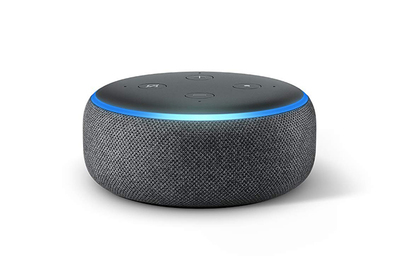
While we're still a far cry from Tony Stark's Jarvis, both Alexa and Google Assistant are pretty decent as digital administration—if y'all're willing to lower your expectations. Either assistant tin competently respond most basic questions, including some that are time- and location- dependent, such as queries about the atmospheric condition and electric current events. And both can manage to-practice lists, calendars, and shopping lists, and even purchase stuff online (though to varying levels of success, depending on which shopping services yous already use). We recall Alexa is the amend overall performer by a hair, due to its far greater compatibility with 3rd-party services and massive catalog of Skills. The entry-level Amazon Repeat Dot is a great mode to try out Alexa. It'south as like shooting fish in a barrel as plug-and-play and can often be found on sale for the price of a case of beer (and sometimes even a six-pack), and yet it'south capable of doing well-nigh everything its pricier siblings tin can do. For more robust sound, consider the Echo Plus or Echo Studio.
Alexa will capably give you a weather condition forecast, read your customized news-flash briefing (choose from more than ii,000 news and information sources), tell jokes, help out with math issues, add events to your Google or Outlook calendar (and read them back to you on request), and handle a host of other simple requests. If you're an Amazon Prime number member, you tin order products from Amazon directly through Alexa.
Alexa's master advantage over Google Banana is its catalog of more than 80,000 Skills, which are similar apps for voice-controlled speakers. Many of these Skills are adult by services y'all might already use, such as Domino's Pizza, the to-practice listing app Todoist, Task Penguin, America's Test Kitchen, Uber, and Starbucks. Enabling them allows y'all to personalize Alexa to your needs, and they are a definite signal in Amazon's favor (and if a service you employ isn't offered direct through Alexa'south Skills library, plenty of IFTTT applets are as well available).
Use your connected Echo, Flex, Dot, and Show devices as a domicile intercom system. After naming each device and enabling the Drib-in characteristic, initiate walkie-talkie intercom chats betwixt whatsoever 2 devices in the house (Driblet-in simply works with Amazon'due south Repeat devices). If you have the Echo Bear witness or Spot, use these features to video conversation as well. Merely proceed in mind that your chat partner needs to also have an Alexa device with a screen or the Alexa app on their smartphone to video chat; y'all can too identify audio phone calls to regular numbers.

Google Banana devices handle the basics about likewise as Alexa: Add reminders, bank check your calendar or the conditions, ready alarms and timers, and schedule a recurring alarm, and even inquire the device to translate a phrase from English language to another language. You don't get admission to Amazon Prime shopping, of grade, but you can purchase things through participating Google Shopping retailers, including Costco, PetSmart, and Bed Bath & Across.
After setup, Google Banana tin tell people apart by the audio of their vox and answer to personalized requests such as "Hey Google, what's on my schedule today?" On Alexa devices, you lot take to ask to switch between accounts—an inconvenience when you lot're trying to guild tea from your Amazon account instead of your partner's, only it's not often noticed if you mostly use a speaker for smart-domicile and music command.
In early 2018, Google added Actions, a feature similar to Alexa'southward third-party Skills but with a much smaller library (yous can also go to IFTTT and get preprogrammed automations). In the Google Dwelling app, expect through the bachelor Deportment (found nether Settings, then Services), and speak the command to trigger an Action. In that location you lot'll find Actions for ordering Domino'due south Pizza, getting psychotherapy advice (note: we don't actually recommend getting mental-wellness advice this way), or finding the schedule for Seattle's public pools. You lot may likewise opt to schedule multistep Routines, which let you automate tasks or smart device actions—for instance, turning off the lights and music and turning down the heat when you say "Good nighttime." Information technology's also possible to set Reminders and Google Calendar entries, or make outgoing phone calls. If you happen to have a Google Hub Max, you can likewise place video calls to other Hub Max devices, or via the Google Duo app.
All-time at answering questions: Google Assistant

Our choice
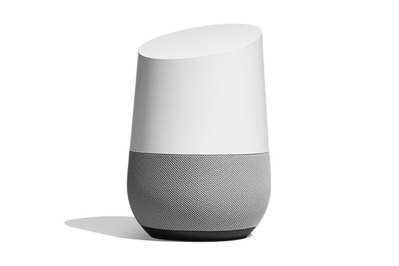
When information technology comes to answering life's questions, big or pocket-sized, Google'due south master advantage over Alexa is, well, Google. In endless hours of testing, Google Assistant attempts to answer more questions, offers a flake more contextual information, and usually gives a longer (though non necessarily more informative) answer than Alexa almost every time.
In practice, information technology was difficult to stump either assistant. Alexa stated she couldn't help when nosotros asked to run across upcoming events nearby or tell us what to consume that night (rephrasing equally "Where can I get pizza?" prompted restaurant suggestions), whereas Google Assistant pulled up a range of options. When we asked what the best Bluetooth speaker was, Alexa pulled up the best sellers on Amazon, while Google Banana showed us a list from an article. Both tin tell you lot how belatedly Target is open, tell you the population of China, and country how many teaspoons are in a cup. Google is better if you enquire how to roast a chicken or what wine goes with steak, simply you lot tin can find more than than 300 Alexa Skills about cooking and another 100 or so for wine fans. Serious cooks might prefer a smart display, which combines a digital banana with a screen that can brandish recipes (come across our guide to the best smart displays).
One of the other search-related advantages Google Assistant offers over Alexa is the ability to track the context of your queries based on previous inputs. For instance, subsequently yous enquire "Hey Google, when did the Sex Pistols course?" and receive your reply, you tin follow up with "Hey Google, who was the lead singer?" without having to say "Sex Pistols" again. However, in our time with the device, we didn't actually observe much utilize for that feature.
Best digital assistant: Alexa

Our pick
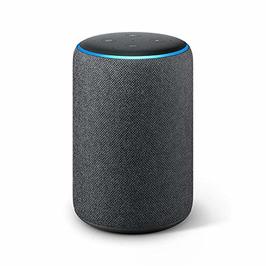
Alexa and Google Assistant provide a convenient and versatile mode to control popular smart-dwelling house devices. Technically, most smart speakers aren't actually smart-home hubs (similar SmartThings or Wink). Rather, they're more like vocalisation-activated universal remotes, the duct tape that binds together disparate, frequently competing systems that otherwise wouldn't play nicely. A few Alexa devices, similar the Echo Plus, Echo Show, and Repeat Studio, do have congenital-in Zigbee wireless hubs, however, which allow yous to integrate devices without using other hubs. In this respect, Alexa is the clear winner, because Echo devices command far more smart-home gear than Google Assistant ones can, including Philips Hue, Samsung SmartThings, LIFX, Lutron Caseta, Belkin Wemo, Wink, Alarm.com, and more. Nosotros accept split guides dedicated to our favorite Alexa-compatible and Google Dwelling house–uniform devices (along with a piece on HomeKit-integrated gear). You can find a complete listing of Alexa-compatible devices on Amazon'southward Alexa page.

Google Banana does a good chore decision-making the smaller selection of smart-domicile devices it works with, and while it doesn't pair upward with quite every bit many devices as Alexa, some integrations are a fleck easier to use. For example, its integration with the Nest Learning Thermostat lets you say "Hey Google, make it warmer" to raise the temperature. With Alexa, you lot demand to say "Alexa, turn living room Nest to XX degrees," and if y'all vary your language it but won't work. Both platforms allow you deploy Routines so yous can, for example, use ane command to turn off all the lights and lower the thermostat. You tin schedule those Routines to happen automatically at a certain time instead of having to say "Hey Google, good night." Google Nest Hub owners tin can as well control all of their smart home devices from the Home View dashboard on the display screen. Bank check out our guide to the best smart devices for Google Home for more information.
All-time for video: Tie
Our option
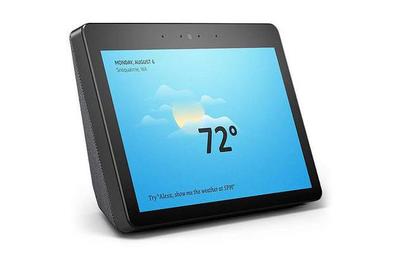
Amazon Repeat Evidence
Alexa with a screen
Nice sound, a crisp screen, and premium video options—plus broad smart-device compatibility—make the Repeat Prove the virtually well-rounded smart display for using Alexa.
Ownership Options
Purchase from Amazon
*At the time of publishing, the cost was $180 .
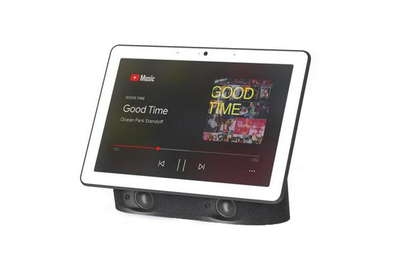
Smart displays pair the abilities of a smart speaker with a screen, which can be useful if you want to lookout man movies or pair with other smart devices, like an outdoor security camera. They also make hands-complimentary video calling far more user-friendly and turn out to be really bang-up assistance in the kitchen to find and display recipes.
Nosotros like both the Amazon Echo Testify (2nd Gen) and Google Nest Hub Max for their large, well-baked screens—just similar all smart speakers, what you ultimately choose should depend on the apps and smart-abode devices you already use. For example, nosotros recollect the Repeat Show does a better task of integrating with smart-dwelling devices and has better video services. The Nest Hub makes more sense for gorging domicile cooks and power users of Google apps like Calendar, Photos, YouTube, and others. You can read our guide to the best smart displays for a more detailed look and help in deciding which display best meets your needs.
Privacy and security concerns
Both Alexa and Google Assistant devices feature microphones that are e'er listening for a "wake discussion," like "Alexa" or "Hey, Google" (they also have a mute push button to turn off the mic, if you want to ensure privacy). When a smart speaker hears its wake word information technology jumps into action and sends a recording of the command it hears to its cloud servers, where the control is translated into an action—you get music or whatever else you asked for (hopefully).
The fact that these speakers are always listening concerns some users and privacy advocates. In 2016, police requested access to the archived recordings of an Echo to find if it could aid in a murder investigation. Amazon initially declined the request; when asked about the matter, Amazon said in a statement that, as a affair of course, it "objects to overbroad or otherwise inappropriate demands." A few months later on, the company relented.
Should you be worried most all that? Information technology's really more about your comfort level with Net-connected things, since fifty-fifty TVs are at present sending your viewing data (and phonation recordings) back to their masters. All the data going up and down to Amazon's and Google's servers is encrypted, and both devices require secure passwords during the setup process, so your data is unlikely to go intercepted by anyone outside of those companies.
Both devices employ their listening skills to accumulate data near you, not just for product-improvement purposes merely also for marketing and advertising. Every time yous ask your device to play Chopin or where the closest Ethiopian restaurant is, that data is beingness crunched with other data to create a profile of you. Both Amazon and Google let users delete all recordings, simply they warn users that deleting information may as well affect how well the systems answer to yous. In add-on to helping them target marketing to you, the data collection assists the devices in becoming ameliorate listeners past helping them ameliorate their respective vocalisation-recognition abilities. You can view and manage your Google Domicile history here and your Amazon Repeat hither.
What to look forward to
Amazon announced the $100 Amazon Echo (quaternary generation), which is due this autumn and will replace both the current Repeat and the current Echo Plus. The 4th-gen smart speaker will also act equally a smart-home hub cheers to built-in support for some Zigbee wireless devices. Nosotros program to test information technology before long.
The newest version of the Amazon Echo Dot (4th generation) has the aforementioned orb-similar shape every bit the new Repeat, and at just $50 information technology's half the price. But it isn't as powerful, and it doesn't include Zigbee wireless support. We'll update this guide once we've had a chance to test information technology.
The $250 Amazon Echo Testify ten is a dramatic update to the Repeat Prove line. Its 10.one-inch tiltable screen is connected to a base that houses a big speaker and a built-in motor that automatically rotates the display to follow you effectually while you're on a video phone call. Nosotros look forward to testing information technology out soon.
Amazon spent its fall 2019 product-rollout event announcing Alexa integrations into ever-stranger devices, including a ability-adapter–sized speaker that plugs directly into a power outlet (Echo Flex), earbuds (Echo Buds), a ring, and spectacles. They speak to a future where Alexa is not only a speaker on your kitchen counter only also an ever-there assistant that seamlessly transitions from work to the route to domicile.
Sources
-
Will Greenwald, Google Nest Hub Max, PCMag , September 9, 2019
-
Scott Gilbertson, Jeffrey Van Camp, The Best Smart Displays, Wired , November 22, 2019
-
Volition Greenwald, The all-time smart displays for 2019, PCMag , Nov 27, 2019
-
Erika Rawes, The best smart displays for 2019, Digital Trends , Nov 21, 2019
-
An Update on Bringing the Google Assistant to Sonos, Sonos Blog
Difference Entre Google Home Et Alexa,
Source: https://www.nytimes.com/wirecutter/reviews/amazon-echo-vs-google-home/
Posted by: williamsletly1959.blogspot.com


0 Response to "Difference Entre Google Home Et Alexa"
Post a Comment